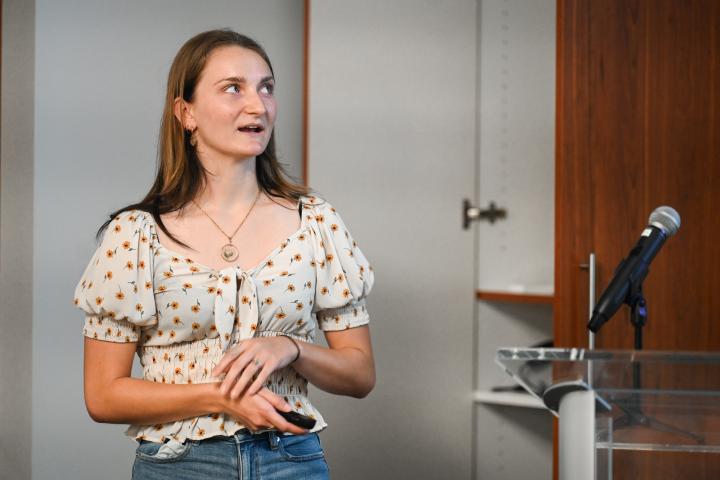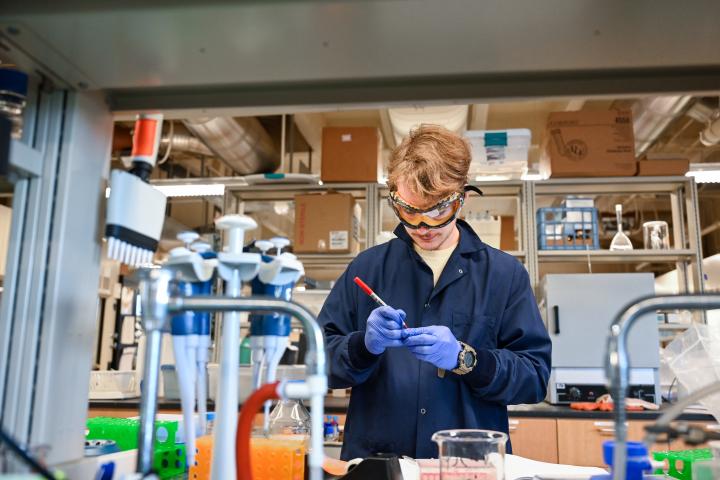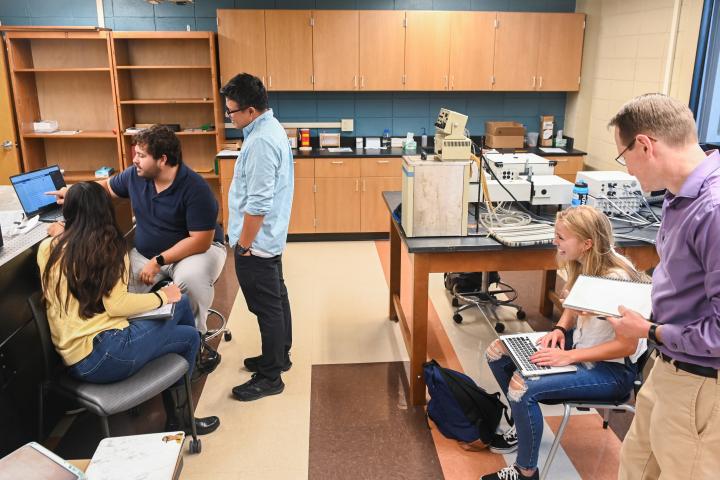Getting Started in Research

Why Conduct Undergraduate Research?
Undergraduate research offers invaluable experiences that go beyond the classroom. Here's why you should consider getting involved!
- Deepen Your Understanding: In the research lab, you’ll have the opportunity to apply the knowledge you learn in your classes at UTC to ask interesting, real-world research questions. Working alongside faculty members, you will use the scientific method to make a hypothesis, design experiments, collect data, and contribute to advancing knowledge in chemistry and physics. This unique environment develops critical thinking skills, fosters independent problem-solving, and exposes you to laboratory techniques, chemical literature, and communication skills.
- Earn Course Credit: Most students conducting undergraduate research enroll in CHEM 4997 or PHYS 4997, which are upper-level elective courses that count toward your major requirements.
- Financial Support Opportunities: You may be able to earn a research stipend or hourly pay by participating in the Undergraduate Research Program (URP) or by working with faculty who have external funding. (Note: students may only receive course credit or payment in a given semester, but not both.)
- Mentorship and Career Development: Students experience close mentorship from their faculty research advisor. This relationship supports career-building, professional development, and educational planning.
- Explore Your Passion for Chemistry and Physics: Undergraduate research can lead to a deeper interest in science. Whether you decide to pursue a career in research or find that you’d prefer a different path, the experience is valuable in helping you make important decisions about your future.
- Opportunities for Publication and Presentation: Many students involved in undergraduate research have the opportunity to present their work at academic conferences or publish a paper with their faculty mentor. On-campus opportunities, such as presenting at research day, applying for URaCE funding, and writing an honors thesis, offer students additional experiences to grow their academic profile.
How do I start?
There are several recommended steps for applying to this program, which increase the likelihood of being accepted.
- Start Early: Research can begin any time during your undergraduate career. We encourage you to start thinking about research early in your time at UTC, even as a freshman!
- Check URP Deadlines: The Undergraduate Research Program (URP) accepts applications at the end of each fall semester, and many faculty bring new students into their research group through this program. However, even if it’s not the fall semester or you’re not interested in URP, read the URP page to see faculty research descriptions and learn about on-going projects. project descriptions and determine who is conducting research that you are interested in.
- Explore Faculty Research: Visit the Research-Active Faculty page to read about each professor’s research areas. Not all faculty participate in URP every year, so this may broaden your list.
- Choose Faculty to Contact: Once you have read about faculty research areas, pick 2-3 professors whose research interests you. Don’t worry if you haven’t taken their courses yet – faculty don’t expect prior experience! The area of research you work in as an undergraduate doesn’t have to perfectly align with your career plans. Research skills are transferable and can benefit any field of study!
- Reach Out: Send a brief email to the faculty members you’ve selected. Introduce yourself (major, interests, career goals), explain why you’re interested in their research, and ask if you could meet to discuss potential research opportunities. Keep your email professional and polite. If you don’t hear back in 2-3 business days, send a courteous follow-up.
- Meet with Faculty: Don’t be too nervous! Faculty members are eager to share their research with students. Be engaged, ask questions, and if they send you anything to read, be sure to review it beforehand so you are prepared to have meaningful discussion.
- Follow Up: After the meeting, send a short thank-you email. The faculty member will let you know the next steps, whether that be applying to URP, joining a research group through CHEM/PHYS 4997, or another opportunity.
- Keep Trying: If you aren’t selected for research or URP, don’t give up! There are more chemistry and physics majors than research positions, so the process is competitive. To improve your chances, focus on your grades, work as a TA or PLTL leader, or ask faculty if you can shadow their current students. You can also ask for recommendations on other faculty looking for research assistants.
Getting involved with research may take time, but persistence pays off!

What are my options?
- Since 1986, the Department of Chemistry has conducted summer research funded by the Grote Chemistry endowment. This outstanding program pairs students with faculty for 10 weeks of hands-on research. Students receive a substantial stipend, participate in weekly seminars, and are awarded travel funding to present their results at a professional meeting.
- URP students typically enroll in CHEM 4997 or 4995 the semester prior to and following their URP summer.
- The application process begins in October, with decisions made prior to winter break.
Take Research for University Credit
- CHEM/PHYS 4997: This research class is usually taken in the fall or spring semester. Students commit to 6 hours of lab work per week for 2 credit hours and present their results in written form and/or orally at a special departmental seminar at the end of the semester.
- To get started, discuss potential research projects with faculty members. See the "How do I Start?" section for more details.

Write an Honors Thesis for University Credit
An Honors Thesis is a great way to gain valuable research experience, also providing ways to connect with peers and faculty. Note that students need not be in the Honors College to apply for Departmental Honors.
Write an Honors Thesis for University Credit
- CHEM/PHYS 4995: This class is for students pursuing a departmental honors thesis, which is defended before the student’s faculty committee. When approved, Departmental Honors is awarded to the student.
- This course requires a proposal that is written a semester before enrolling in CHEM/PHYS 4995. Students take 4995 over two consecutive semesters.
- Students should start planning for this process in their sophomore year, as faculty may require prior research experience before mentoring a thesis.
- To get started, discuss potential research projects with faculty members. See the How do I Start? section for more details.
- All rules, procedures, dates, and forms for departmental honors are available at https://www.utc.edu/honors-college/departmental-honors. A few items from this manual are listed below to help students understand the basic process.
- GPA Requirements: 3.2 UTC GPA or 3.5 major GPA
- Any student (normally a junior-level student) seeking to earn Departmental Honors must apply for admission to candidacy no later than three semesters prior to the intended date of graduation.
- Students must complete and submit digital copies of a thesis proposal and the “Application for Admission to Candidacy” (See Appendix A) with all required signatures to the Honors College by the deadline specified in the current calendar (See Appendix D). Digital submissions should be emailed to [email protected] in a single file.
- For complete instructions, see Section V of the Departmental Honors Manual. Please attach a formal thesis proposal (about 1000 words) and a preliminary bibliography. Submit a digital copy of the signed cover sheet and thesis proposal in a single file to the Honors College via email to [email protected].
- After receiving the application and proposal and verifying the student's GPA eligibility, the Honors College will forward the materials to the major department. The applicant's major department is responsible for reviewing and approving Departmental Honors thesis proposals.
- Our Departmental Faculty Honors Committee will review the proposal and approve, reject, or suggest changes to be included in a modified thesis proposal to be returned to the honors program. Once the proposal or modified proposal is approved by the committee and signed by the Head, the department should notify the student and the Honors College (via email to [email protected]) of permission to register for the appropriate departmental thesis course (4995).